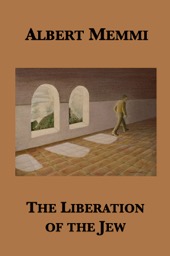 $9.99 on Kindle
$9.99 on Kindle(cover: Departure II, 2010 by Jean Hearst)
The Liberation of the Jew by Albert Memmi (translated from the French by Judy Hyun; 86,000 words)
In this book, written after The Colonizer and the Colonized and Portrait of a Jew, Albert Memmi writes, “It is true that all oppression has a strong tendency to become a total oppression, but it is a question of degree and nuance, of generalities and accent. The specific conditions of each oppression consists precisely of such degrees and particular intonations. The Jew is not oppressed as a member of a class, which distinguishes him from the proletariat, for example. Nor is he oppressed as a member of a biological group, which distinguishes him from Negroes or women. He is affected as a member of a total, social, cultural, political and historical group. In other words, the Jew is oppressed as a member of a people, a minor people, a dispersed people, a people always and everywhere in the minority (which distinguished him from the colonized, also oppressed as a people, but a people in the majority). [...] The Jew must be liberated from oppression, and Jewish culture must be liberated from religion. This double liberation can be found in the same course of action — the fight for [the State of] Israel.”
Portrait of a Jew and The Liberation of the Jew “form a whole: the beginning and the outcome of a passionate quest. The first offers a diagnosis, the second a remedy. [...] Both are written with moving sincerity [...] As a personal document, Memmi’s introspective study is valuable. Thought-provoking and disturbing in the best sense of the word, it allows us to look into the tormented mind and soul of a distinguished Jewish writer who aspires to live honestly while belonging simultaneously to two worlds. His doubts and affirmations carry the weight of testimony.” — Elie Wiesel, The New York Times
“Portrait of a Jew and The Liberation of the Jew [are] filled with a Jewish existentialism marked by quest for identity and self-affirmation far more psychological and sociological than traditionally religious.” — Richard Locke, The New York Times
“[The Liberation of the Jew] is in large measure a personal record. It is a moving record [...] The poignancy of this unique work stems from its being a courageous self-analysis by a highly sensitive artist. Its confessional honesty is complete.” — Louis Schwartzman, Journal of Jewish Education



